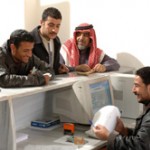
Although its natural resources are limited, Jordan's population growth is accelerating, posing a real challenge to health, education, and social service development. Jordan's population of 5.29 million people is growing at the fast rate of 2.59 percent.

With 5.3 million people and a largely arid environment, Jordan suffers from a major water scarcity problem that presents great problems for its development. Jordan is one of the ten most water-deprived countries in the world, and its rural communities, which are dependent on agriculture, suffer the most because of a lack of water and energy infrastructure. East Shigera, a village of 129,000 people in southern Jordan, is one of many rural communities where residents live below the poverty line due to large family size, unemployment and their arid location. But the community also has a vibrant, dynamic civil society committed to improving the lives of its people.

Jordan's Central Bank is the focal point of the finance industry, responsible for monitoring operations of all of the Kingdom's banks. But the bank's technology was out of date, its network and other systems were inadequate for a modern bank regulator. Its wide area network (WAN) only linked some of its locations and didn't connect the Central Bank with Jordan's commercial banks. Moreover, the Central Bank's outdated infrastructure couldn't support the software needed to adhere to international best practices.

USAID has worked with Jordan's microfinance institutions since 1998 to increase availability of credit to low-income borrowers to boost the national economy. Initially, when loan portfolios were small, lending institutions kept administrative records on a simple spreadsheet. But the success of the small-loan program meant that the institutions rapidly outgrew their simple systems. For microfinance institutions to continue their rapid growth, they needed to standardize recordkeeping and reporting in a way that would make it easier for them to benchmark performance against each other and institutions in other countries.

Registering or renewing a business license in Jordan was once an arduous task. The registration system required lengthy procedures for both local governments and businesses. The time required for a new business license to be processed and issued could add up to 96 days, while a license renewal ranged from 17 to 40 days. It was also expensive — the cost of registering or renewing a license could add up to $420 dollars annually. In addition, the logistics were complicated; in order obtain the necessary signatures, an applicant had to make between six and 14 visits to various offices and authorities.








Comment
Make a general inquiry or suggest an improvement.